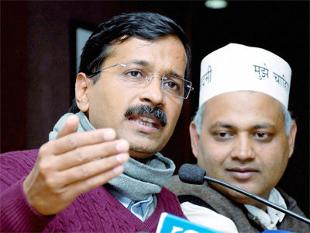 New Delhi, Jan 14: In the latest twist to the controversy surrounding AAP leader Somnath Bharti, Delhi's CM Arvind Kejriwal defended his law minister saying that the court's observation in the matter is "completely wrong".
New Delhi, Jan 14: In the latest twist to the controversy surrounding AAP leader Somnath Bharti, Delhi's CM Arvind Kejriwal defended his law minister saying that the court's observation in the matter is "completely wrong".
"A sting operation has been called tampering of evidence — it is not tampering of evidence," the chief minister said.
Defending his stand on the issue, Somnath Bharti has stated that the allegations against him are "lies". He has also maintained that his actions were a measure to add to the evidence and not "tampering with it". He also appealed to the CBI to investigate the matter properly and to 'catch' the real culprit.
He added that, "It was me who wanted to bring out this audio record; we never tried to influence the prosecution witness. We made an audio CD to expose the witness who was giving out false claims."
In order to maintain his stand regarding the alleged tampering, Bharti said that he "will make public the transcripts of the conversations we had with the witness".
The law minister's track record as a successful lawyer involves an indictment for "tampering with evidence" by a Patiala house court.
The case relates to Pawan Kumar's prosecution by the CBI in three separate cases for his alleged acts of omission and commission while employed with the State Bank of Mysore since 2006. As one of the cases came up for trial, testimony of BS Diwakar, a prosecution witness was recorded in court. During his cross-examination, Kumar through Bharti told the court he wanted to confront Diwakar with an audio conversation and wanted to place the same on record.
A surprised court then learned from Kumar that he/his advocate Bharti, had a telephonic conversation with Diwakar. Kumar claimed during the talk on phone, Diwakar expressed a different opinion relating to the corruption case than what he testified in court.
The CBI demanded that Kumar be sent back to jail, accusing him and Bharti of influencing a witness and trying to tamper with evidence.





Comments
Add new comment